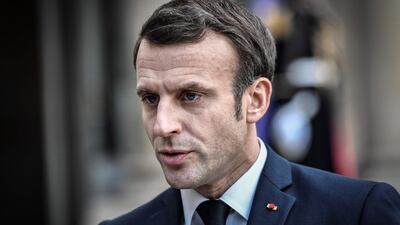French President Emmanuel Macron is expected to address the nuclear threat posed from Iran as he sets out his nation’s position in a watershed speech on the nuclear deterrent.
Mr Macron has followed many of the pillars set down by his predecessors in preparing the landmark address. The main update will focus on the fact France, and Europe more widely, is faced with more nuclear threats than has been the case in recent years.
Iran and North Korea, in particular, pose threats on the nuclear stage and the established arms controls agreements that have underpinned western nuclear policy for decades are in the process of unravelling.
Mr Macron is due to recommit France to the nuclear deterrent and explain his country's nuclear posture.
In a speech in January 2018, he committed France to a renewal of its nuclear capability at sea and by air until 2035.
Alice Billon-Galland, a research associate at Chatham House’s Europe Programme said: “We are seeing a return to a number of different nuclear problems in Iran, in the Korean peninsula with a lot of arms control agreements no longer in existence anymore.
"[Mr Macron] has been worried by these threats and the state of European security. I think we may see quite a bleak speech about what is looming over Europe and the fact that Europeans need to address them directly," she told The National.
Mr Macron is expected to make a commitment to nuclear non-proliferation. World powers’ 2015 nuclear deal with Iran was seen as a bulwark against proliferation in the region and now, as it hangs by a thread, Europe has looked to the agreement as a route to mediate escalating tensions between the United States and Iran.
The United States’ withdrawal from both the Iran nuclear deal in 2018 and its withdrawal in 2019 from the Intermediate-Range Nuclear Weapons Treaty (INF) have realigned Paris’ nuclear position.
Washington, under US President Donald Trump, has also threatened not to renew the New Start treaty on nuclear weapons after it expires in 2021.
"France, Germany and the other European countries are now threatened by new Russian missiles," Mr Macron said last year following the US's INF withdrawal.
The vacuum created by the US in the nuclear arena has Mr Macron poised to open a distinctly European dimension to France’s nuclear weapons policy. He has made a European security a cornerstone of French defence strategy throughout his tenure.
He is set to tentatively expand this into the nuclear arena as, with Britain’s departure from the European Union, France becomes the only nuclear power remaining in the EU.
The French president showed his intention during a recent visit to Poland. "I will come back specifically to the [nuclear] doctrine, but also to the procedures and methods that I wish to propose on this subject in the coming months to our partners," Mr Macron said referring to his Friday speech.
There are signs Germany, which is normally reticent to involve itself in issues regarding nuclear weapons, may be looking for greater involvement in the creation of an EU nuclear deterrent.
However, Ms Billon-Galland warned the prospect of pooling France’s nuclear deterrent among the EU nations was not on agenda. The Elysee will not share control of the nuclear button with any other capital. “The nuclear issue is quite unique and quite specific,” she said. “The nuclear deterrent is France's nuclear deterrent so the control of it remains in the hands of the French Republic,” she added.

